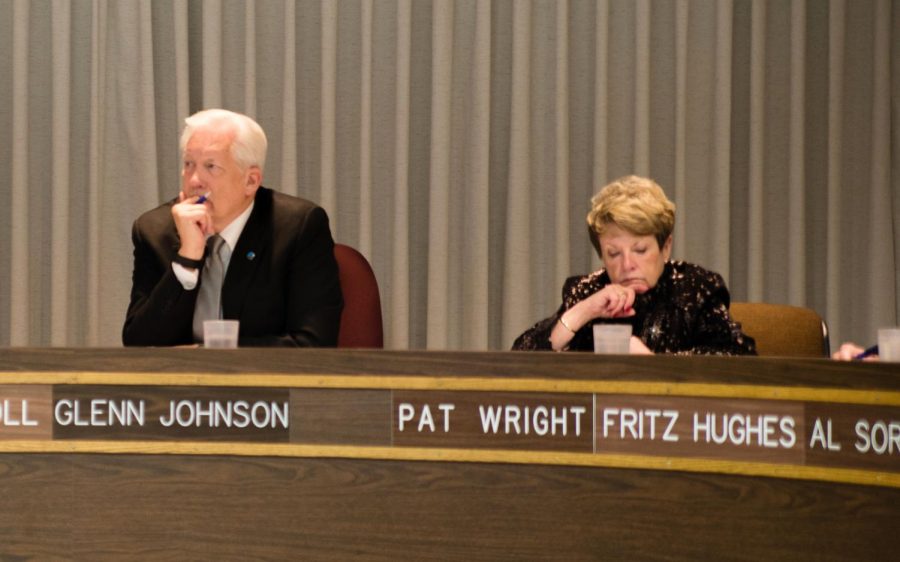Pullman wants more from pot tax
Most tax revenue redistributed to state jurisdictions, trusts
DES MARKS | DAILY EVERGREEN FILE
Pullman Mayor Glenn Johnson says local governments should receive more tax revenue from cannabis sales because they directly deal with the consequences.
February 7, 2018
Last year, local cannabis shops generated nearly $7 million in taxes. Of that, the city of Pullman collected just $27,000. Now city and county officials across Washington are lobbying for changes that would send more of that money back to local governments.
“We, as cities, believe we should have larger contribution since we deal with the local impacts,” Pullman Mayor Glenn Johnson said.
Mikhail Carpenter, media relations spokesperson with the Washington State Liquor and Cannabis Board, or LCB, said via email that there will be $6 million available in revenue to be distributed statewide in fiscal year 2018 from the marijuana excise tax collected by the state.
Since the initial passage of I-502 in November 2011, local authorities have received distributions from the state Legislature. Voters approved I-502, which did not specifically allocate funds to cities or counties, Carpenter said.
The LCB deposits the money generated by excise taxes into the state’s dedicated cannabis fund, which is then distributed as directed by law, Carpenter said. In the case of local authorities, funds can be used for public safety measures.
“We do not have the authority to levy/change taxes or direct their distribution,” Carpenter wrote in an email. “That power rests solely with the Legislature.”
In 2017, the city of Pullman received about $12,600 from the state for marijuana enforcement, and the city’s general fund received about $14,850 in marijuana excise tax money, Pullman Finance Director Leann Hubbard said via email.
In fiscal year 2017, legal pot sales in Washington state exceeded $1.3 billion and the state collected more than $300 million in excise taxes. This fiscal year, cannabis sales have topped $500 million and generated more than $100 million in taxes.
Local jurisdiction
According to the LCB regulations, the Legislature decides how to distribute marijuana excise tax revenue. The total amount available for distribution to counties and cities in 2018 is $6 million. The amount of tax money that cities, towns and counties receive is based on how much cannabis they sell, as well as their populations.
Of the $6 million, about $1.8 million will be distributed across all jurisdictions that generated marijuana tax money. The amount each jurisdiction receives is based on the amount of tax money it brings in, according to LCB documents.
The remaining 70 percent, $4.2 million, is distributed to counties, cities, and towns proportionally on a per-capita basis. Counties receive 60 percent of the $4.2 million, or about $2.5 million, and cities and towns receive the rest, about $1.7 million. Jurisdictions are not eligible to receive the tax money if they prohibit licensed retail cannabis sales, according to LCB documents.
However, Carpenter said if the revenue forecast for the Legislature’s General Fund increases, or exceeds previous predictions, the amount of money the state could distribute could increase to $15 million.
Distributions in FY18
Of the money the state keeps, $170 million, or nearly 50 percent of the estimated state revenue, will be allocated to the Basic Health Trust Fund Account. About $120 million, roughly 34 percent, will be allocated to the state’s General Fund, Carpenter said via email.
The Washington Health Care Authority received $16.2 million, or 4.6 percent, for contracts with community health centers. The Superintendent of Public Instruction received about half a million, or .15 percent, for dropout prevention.
The Department of Health and Human Services received a flat half million for its bi-annual youth survey. University of Washington received a flat $20,000 for public education materials at its alcohol and drug abuse institute.
University of Washington received $227,000 to study the long-term effects of cannabis, and WSU received $138,000.









